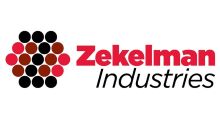Analysis
August 22, 2023
Steel Summit: Zekelman Talks Consolidation, Industry Dynamics
Written by Laura Miller
Barry Zekelman, executive chairman and CEO of Zekelman Industries, joined SMU managing editor Michael Cowden in a fireside chat to close out the first day of the 2023 Steel Summit.
The candid chat gave insight into Zekelman’s past and how he fell into the steel industry, what’s hot right now in steel, and how that’s helping to shape the future of his company and this industry.

Zekelman’s start in the industry was unfortunate: When Zekelman was just 19, he inherited a steel tube mill after the passing of his father. With curiosity, a mechanically-inclined nature, and a chip on his shoulder – “I love when people tell me I can’t do something,” he said – Zekelman figured out what works, building Zekelman Industries into the company it is today. The Chicago-based pipe and tube producer has 18 locations with 2.8 million net tons of annual production capacity. And in 2016 it expanded into new territory with the launch of Z Modular, a modular constructions solutions company.
Speaking on current industry dynamics, Zekelman highlighted the solar industry, which is exploding and will require massive amounts of steel. “It’s real and it’s coming,” he said, predicting the solar market will consume 3 million tons of steel annually by 2025/26.
There’s currently a cultural shift taking hold as the country and the world have started to consider environmental impacts, Zekelman said. With green solutions such as electric vehicles (EVs), there’s still a long way to go, however. While the infrastructure is still severely lacking for EVs, he thinks “it’s going to be a shit show,” predicting traffic jams on freeways and possibly fist or gun fights at charging stations. There are going to be “some coming-to-Jesus moments,” he prophesied.
Additionally, the energy required to power EVs is going to be massive, which will effect how the power grid is developed. “I don’t think any of us realize what’s coming,” he said.
Zekelman speculated there will be a United Auto Workers (UAW) strike when labor contracts with the Big Three Detroit automakers expire next month. With the two sides fighting for a strong position, each will have to flex their muscles, he said. He anticipates any strike will be short-lived, however, as it wouldn’t really be in the interest of either of side to hold out for very long.
He and Cowden discussed on stage future potential opportunities for Zekelman Industries.
Following up on a recent statement that he’d be unhappy if he didn’t buy a steel mill before he died, Zekelman reiterated that dream: “It wasn’t an offhand remark,” he noted in the fireside chat, saying that although it is an aspiration, that doesn’t mean he’s necessarily going to achieve it. It’d really have to be the right opportunity, he said. Or maybe he’d even build his own. If he can’t solve the problems of getting better performance, better cost, and better products for his current company, he’ll “find a way to solve that to propel my company forward,” he noted.
Diving further into it, he said now is probably not the best time to build a greenfield facility, as nothing seems to be able to be done on time or on budget. It probably wouldn’t be “economically the best decision to make. I’d rather go acquire,” he remarked.
Zekelman said there is plenty of room for more industry consolidation.
On the recent news that U.S. Steel is up for sale, Zekelman commented that “it would be sad to see [the] iconic name absorbed or go away. It represents America…You’re talking about a legend.”
When asked by the audience if he’d be interested in buying the Pittsburgh-based steelmaker, he said he wasn’t sure he had $7.8 billion.
“I don’t know about that. That might be a little ambitious even for me,” he stated.
The 2023 SMU Steel Summit continues through Wednesday at the Georgia International Convention Center in Atlanta. Tuesday’s fireside chats will feature Karla Lewis, president and CEO of Reliance Steel & Aluminum; Cesar Jimenez, president and CEO of Ternium Mexico; and Daniel Needham, EVP, Commercial for Nucor.






